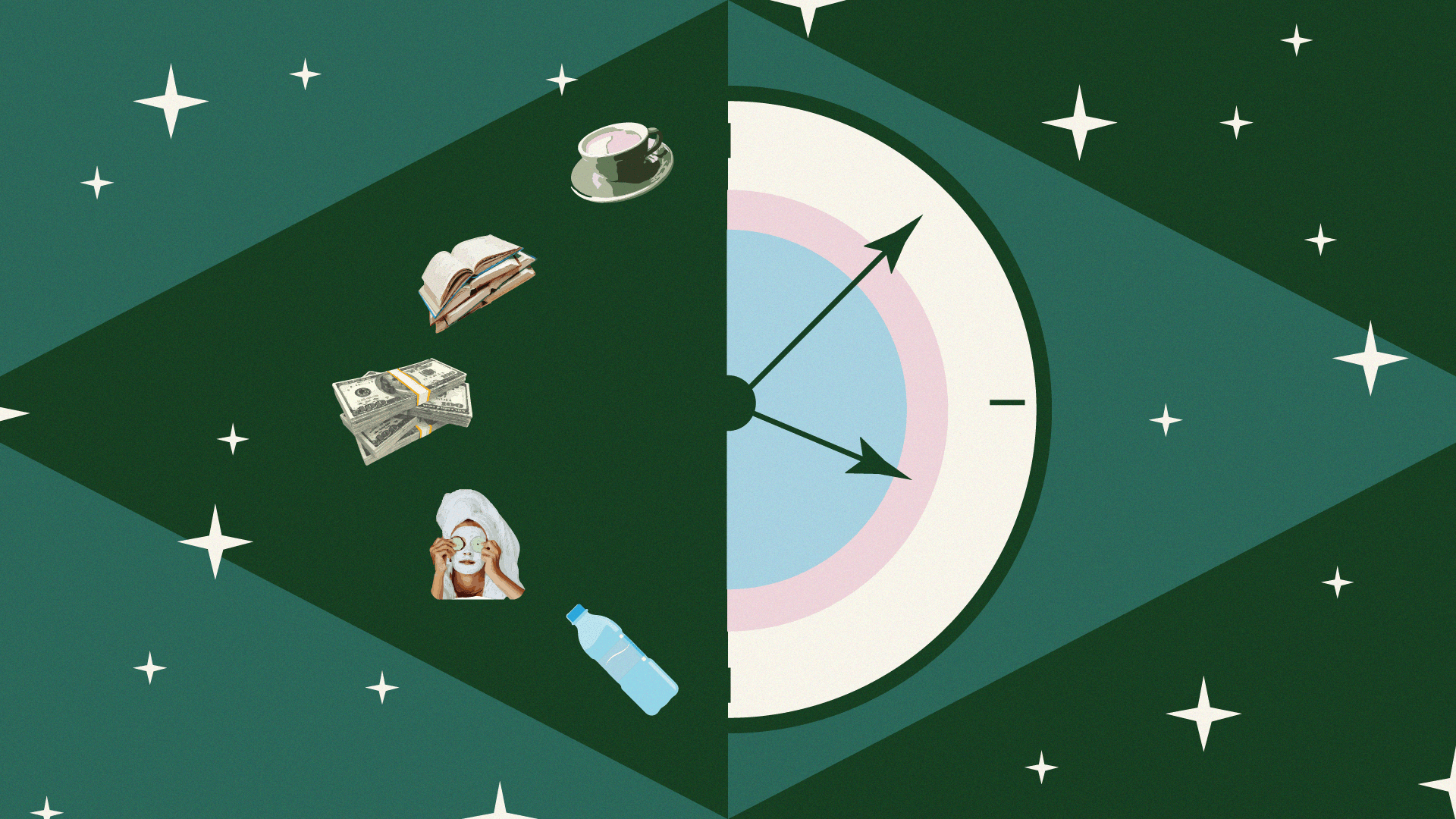
Commercialized Self-Care Steals Our Free Time
Meaningful self-care shouldn’t come with a price tag.
In a world of unrelenting tragedies, self-care serves an important role in our lives: it’s a way to gain rest and reprieve. While it’s not a permanent remedy, it can be a Band-Aid plastered over societal collapse. Self-care is an encouraging hand, urging people to slowly detach from the continuous grind. But the restrictive system of capitalism has violently distorted the power of self-care.
According to the gospel of hypercapitalism, self-care is only possible through continuous purchases like an expensive bottle of wine, esoteric wellness retreats, and elaborate spa treatments. Unfortunately, contemporary wellness culture, which is deeply intertwined with the notion of self-care, encourages this consumerism.
Adopting such a lifestyle may invite a glimmer of personal fulfillment into one’s routine, but it would be expensive to maintain. The average American already spends nearly $200 per month on non-essential items to “treat themselves,” according to Market Watch. That adds up to 22 percent of their yearly disposable income.
To know something so sacred can be turned into a lifeless commodity is rather frightening.
When we equate making purchases with a fulfilling self-care practice, we enter an unwitting trap. With the cost of living increasing due to inflation and higher gas prices, people are struggling to pay the bills while simultaneously maintaining a materialistic self-care regimen.
This pressure to subscribe to a rather unattainable form of self-care often weighs us down and constantly pushes us to work. On a subconscious level, we mirror the hypothetical Sweetgreen addict in Jia Tolentino’s Athleisure, Barre and Kale: The Tyranny of the Ideal Woman who “needs to eat his $12 salad in 10 minutes” because his job “allows him to afford a regular $12 salad in the first place.”
If the only acceptable form of self-care is achieved through acquiring items, then actions like exercising, carrying out a hygiene routine, or simply resting are seen as inadequate. For folks who are living with mental illness, this outlook on contemporary self-care is incredibly harmful because it does not meet their immediate needs. A resounding thread of advice from mental health professionals is that when people are experiencing depressive and manic episodes, it’s important to remember the basic things their bodies need. On the other hand, commercialized self-care expects simple actions like brushing your teeth or washing your face to be a given, not necessarily taking into account the times when completing those tasks alone seems impossible.
True self-care can be incorporated in our everyday life, but on a case-by-case basis. It should depend on what our immediate needs are, not on what they should be. Some days, self-care can be as simple as sleeping in, going on a walk, talking to loved ones, or being in community with others.
I used to laugh at the “romanticize your life” trend on TikTok. I thought it would take the same path as many lifestyle vlogs and follow the unhealthy standards purported by the “that girl” trend. Thankfully, Christiana Caron’s New York Times article The Mundane Thrill of ‘Romanticizing Your Life offers a different path. As Caron wrote, doing so “rejects the type of messaging that pushes people to acquire material things. And it likewise renounces the “that girl” aesthetic that promotes a one-size-fits-all path to well-being, replete with green juices, journaling and working out.
Ultimately, true self-care practices flexibility because every person has different needs. Trends like “romanticize your life” practice this sort of flexibility and allow us to savor the simple moments of our lives.

Another important aspect of self-care is rest. It’s no secret we live in a culture that looks down on leisure. Prior to 2020, being constantly occupied was a status symbol. With the pandemic bringing the world to a halt, many millennials started to reevaluate their relationship to work and how it upended their lives. This inadvertently led to the Great Resignation, where workers in all sectors started quitting their jobs due to burnout.
Yet, even as the Great Resignation is having a powerful effect on contemporary American culture, the core of Americans’ idea of work is rotten, influenced by the so-called Protestant work ethic. As Matthew Huston states in Still Puritan After All These Years, “Martin Luther and John Calvin argued that work was a calling from God,” and viewed “success as a path to salvation: hard work and good deeds would bring rewards, in life and after.” Assigning such spiritual significance to work inevitably leads people to feel guilty and ashamed when prioritizing rest and leisure.
The Protestant work ethic (merged with late-stage capitalism) is a conniving thief of not only time, but the enjoyment of that time. It’s instilled in the hearts and minds of most Americans that it is a sin to release yourself from the grasp of work’s unforgiving arms. For many, it seems like rest and leisure should only be received after grueling amounts of work have been completed.
While it is encouraging to see the Great Resignation highlighting the importance of rest and leisure in our everyday lives, we need to establish that rest and leisure are undeniable human rights. After all, they are essential to our survival. Progressive politicians in Congress can advocate for structural support in regards to rest by enacting laws that institute more paid vacations days. On a more local level, cities can play an active role in ensuring more cultural activities like museums, parks, concerts, and community centers are well-funded and actively promoted so that people can not only find various ways to enjoy time outside work, but build community with one another.
Self-care is a survival mechanism, not a luxury. Viewing it as the necessity it is will give us a newfound sense of freedom. One that’s devoid of toxic idealism regurgitated by corporate interests. When we are fully conscious of the complications life throws at us and divest from commercialized habits, self-care will feel like a simple, warm embrace. A reminder to love ourselves. And eventually, the love we have gained will extend to others and make way for the healing power of community.

